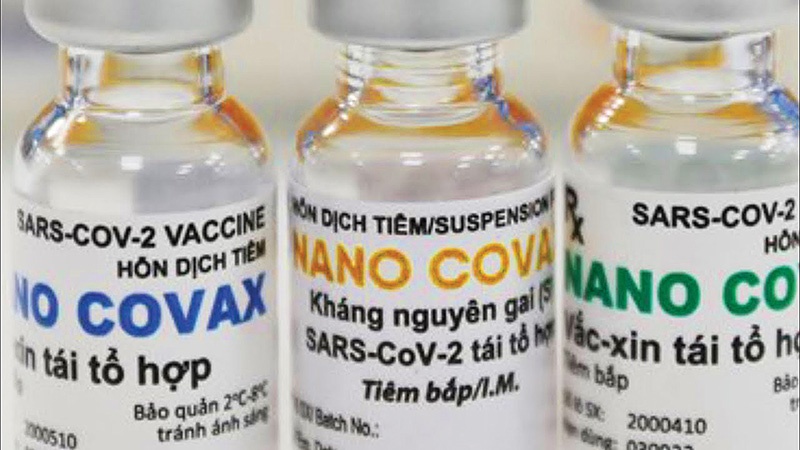India and Vietnam team up in vaccine collaboration
 |
| Vietnam’s Nanocovax could help close the gap between supply and demand of vaccines. Photo: Le Toan |
At last week’s reception for Indian Ambassador Pranay Verma, Vietnamese State President Nguyen Xuan Phuc expressed gratitude to the Indian government for providing oxygen supply and medical equipment for the fight against the COVID-19 pandemic. State President Phuc also requested the ambassador to urge the Indian government to provide Vietnam with an emergency amount of 10 million doses of vaccines as well as additional treatment drugs and medical supplies in the near future.
Thanking Vietnam for supporting India in responding to its own pandemic woes in June, the ambassador said that India will try its best to return the favour. Indian pharmaceutical companies will continue to supply COVID-19 drugs as well as cooperate in production and transfer technology to produce vaccines for Vietnam.
“Although India is carrying out a national vaccination programme, the county pays attention to the pandemic prevention of its partners, including Vietnam. India has also increased its domestic vaccine production capacity to support partners,” he added.
Specifically, India’s Vekaria Healthcare LLP has signed a non-disclosure agreement with Nanogen on the transfer of technology to produce the Nanocovax vaccine.
Yogendra Vekaria, founder cum managing director of Vekaria Healthcare LLP told VIR, “We decided to give preference and priority to the Vietnamese vaccine to encourage and support them, and to jointly become torch-bearers for other developing countries globally.”
He noted that Vekaria Healthcare is coming up with new vaccine candidates in exclusive collaboration with Gujarat Biotechnology Research Centre, the Department of Science and Technology, and the government of Gujarat state. When ready, the company may collaborate with Nanogen as manufacturing partners for Vietnam in the battle to provide protection from new coronavirus variants.
“The potential of Nanocovax is really high because there is a big demand and supply gap. We are trying to advance as fast as possible to cater for this global need. We have big plans for the manufacturing and distribution of Nanocovax in India and globally,” Vekaria added.
The group is in a very advanced stage of discussions with various state governments and other developing countries for setting up new dedicated vaccine manufacturing facilities and swiftly scaling up production further.
In Vietnam, Nanocovax is conducting Phase 3 clinical trials on 13,000 volunteers. Most recently, the National Committee for Ethics in Biomedical Research under the Ministry of Health (MoH) has agreed on the mid-term results from Nanocovax’s Phase 3 trials. The Advisory Council for the Registration of Circulation of Drugs and Medicinal Ingredients has received all trial dossiers and data to consider issuing a registration certificate for the conditional circulation of the vaccine.
Despite the potential, the homegrown candidate is subject to further review before getting approval. The Advisory Council has requested Nanogen to update the safety data for the injected subjects, the immunogenicity of the vaccine, and the protection of the vaccine among others.
Deputy Minister of Health Tran Van Thuan said, “We want to speed up domestic vaccine production as soon as possible. However, this is a special product that affects not only one person but the whole community, and possibly many generations. Thus, the policy of the government and the MoH for homegrown vaccines is fast, strict, safe, and effective. The councils in collaboration with the research units and the authorities of the MoH will review the data before granting the licence.”
In addition, Nanocovax also faces some regulatory challenges like getting approvals from the World Health Organization, the EU, and others. Vekaria said, “Western arrogance can be a major issue possibly for the vaccine and other products coming from developing countries like Vietnam and India. Most people refrain from talking frankly and openly about it. We hope it does not affect us and it shouldn’t affect us.”
What the stars mean:
★ Poor ★ ★ Promising ★★★ Good ★★★★ Very good ★★★★★ Exceptional
Themes: Healthcare Platform
- PM outlines new tasks for healthcare sector
- Opella and Long Chau join forces to enhance digestive and bone health
- Hanoi intensifies airport monitoring amid Nipah disease risks
- Cosmetics rules set for overhaul under draft decree
- Policy obstacles being addressed in drug licensing and renewal
Related Contents
Latest News
More News
- PM outlines new tasks for healthcare sector (February 25, 2026 | 16:00)
- Ho Chi Minh City launches plan for innovation and digital transformation (February 25, 2026 | 09:00)
- Vietnam sets ambitious dairy growth targets (February 24, 2026 | 18:00)
- Masan Consumer names new deputy CEO to drive foods and beverages growth (February 23, 2026 | 20:52)
- Myriad risks ahead, but ones Vietnam can confront (February 20, 2026 | 15:02)
- Vietnam making the leap into AI and semiconductors (February 20, 2026 | 09:37)
- Funding must be activated for semiconductor success (February 20, 2026 | 09:20)
- Resilience as new benchmark for smarter infrastructure (February 19, 2026 | 20:35)
- A golden time to shine within ASEAN (February 19, 2026 | 20:22)
- Vietnam’s pivotal year for advancing sustainability (February 19, 2026 | 08:44)

 Tag:
Tag:




















 Mobile Version
Mobile Version